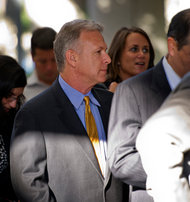A new day of testimony in the patent infringement trial between Apple and Samsung kicked off Friday with an iPhone history lesson from Philip W. Schiller, the most senior Apple executive yet to appear in court in the case.
 David Paul Morris/Bloomberg NewsPhilip W. Schiller arriving at the courthouse on Friday.
David Paul Morris/Bloomberg NewsPhilip W. Schiller arriving at the courthouse on Friday.
But the morning began with a scolding from the federal judge in the case, Lucy H. Koh, directed at Samsung and its lawyer, John Quinn, over Samsung’s public release of evidence earlier in the week that she had ordered excluded from the case. The evidence, Samsung argued, would have helped the company show that Apple’s smartphone designs had been inspired by another company, Sony.
To ensure that no jurors had been tainted by the release, Judge Koh ushered in members of the jury, one by one, and asked if they had seen any news coverage of the case since the last time they were in the courtroom. One juror admitted to reading headlines about the case on the Internet but did not recall seeing anything related to the Samsung press release. Judge Koh warned jurors not to read press reports about the case and said the court planned to save them for the jurors.
“We’re going to compile all of the articles about this case,” Judge Koh said. “At the very end of this case, you’re going to get it all.”
Mr. Schiller, Apple’s senior vice president for worldwide product marketing, entered the courtroom in San Jose, Calif., shortly after 9 a.m. During questioning by Apple lawyers, Mr. Schiller discussed how the iPhone had come to be.
“First, Apple had been known for years for the Mac. Then we had a big hit called the iPod — it really changed the view inside and outside the company,” Mr. Schiller said, adding that Apple began looking at other products it could build. “People were suggesting every idea: make a camera, make a car — crazy stuff.”
“We realized that at the time, cellphones weren’t good as entertainment devices,” Mr. Schiller said. “In addition, at the same time, we’d already started working on a tablet device that would become the iPad.”
Citing press coverage in early 2007, Mr. Schiller said that leading up to the release of the product, “we didn’t need any marketing; we allowed the press to talk about the iPhone.”
That approach soon changed. Apple’s lawyers showed a slide indicating how much money Apple had spent on advertising for the iPhone. Mr. Schiller said that in 2008, it spent $97.5 million in the United States. In 2009, it spent $149.6 million.
Mr. Schiller spoke of Apple’s products as if he was speaking at one of the company’s product unveilings, focusing repeatedly on beauty, design and simplicity.
The Apple legal team seemed to be using this as a cornerstone of their case.
Through court documents and questioning, they continually emphasized the idea that customers are drawn to Apple because of the quality and design of its products. Mr. Schiller said customers buy products like the iPhone and iPad over other products because of Apple’s “consistent design.” He said: “All together, it’s a simple, beautiful look that has stayed consistent across the product line. Customers value beautiful products.”
When asked by Apple lawyers if copying of its products was a problem for Apple, Mr. Schiller said, “It’s a huge problem.” He said that it was confusing for customers, who might see a product advertised on a highway billboard for just a split second.
Mr. Schiller was shown a slide of an iPhone 3GS next to a number of Samsung smartphones. He said he thought Samsung had “ripped off a bunch of our design elements.”
In challenging the originality of the iPhone, Samsung lawyers cited the LG Prada phone that was on the market before it. The phone had a full touch screen with an onscreen keyboard instead of a physical one.
Samsung’s legal team cited an internal Apple e-mail thread discussing different marketing approaches for the iPhone. In one e-mail, Steve Sinclair, an employee in the Apple marketing team, noted that the company could not say that the iPhone was the first full touch-screen phone. “Not true,” he wrote, then linking to a Wikipedia page for the LG Prada phone.
Article source: http://bits.blogs.nytimes.com/2012/08/03/apples-schiller-testifies-in-smartphone-patent-trial/?partner=rss&emc=rss
Speak Your Mind
You must be logged in to post a comment.